3rd Quarter 2019 Report to Investors
October 28th, 2019September 30, 2019
“The future is never clear; you pay a very high price in the stock market for a cheery consensus. Uncertainty actually is the friend of the buyer of long-term values.” – Warren Buffett
The third quarter ended on a higher note despite many uncertainties including the political maelstrom of potential impeachment of the President. This adds to an already long list of investor concerns including China trade, Iranian aggression in the Middle East, unknown proximity to a recession, an upcoming election cycle, and the future path of interest rates from the Federal Reserve. These factors increased volatility over the second quarter, as you can see in Chart 1.
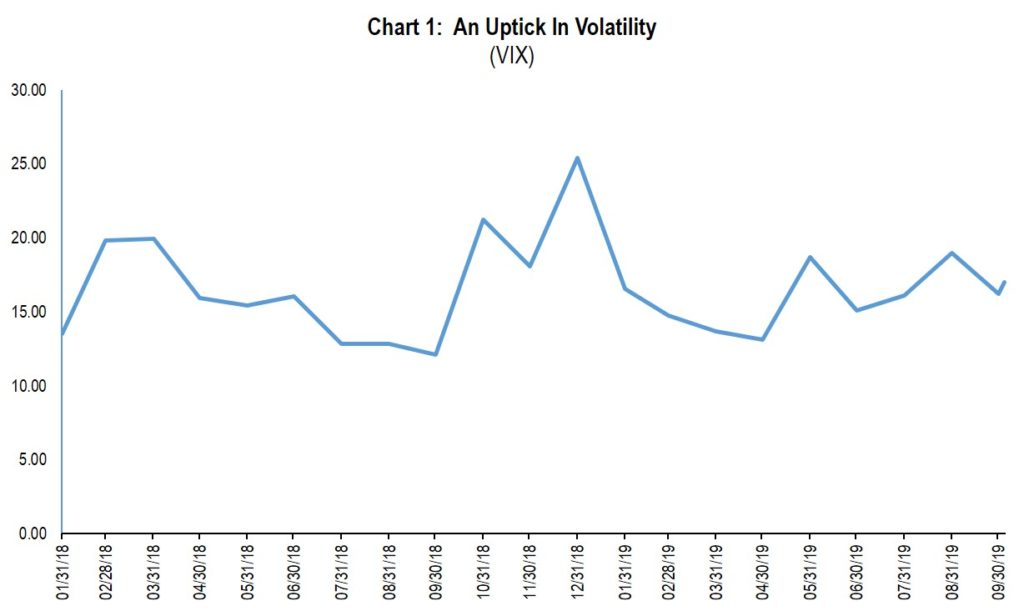
Given the list enumerated above, it is no surprise that volatility picked up but probably not as much as one would have expected. As a matter of fact, up to this point, the volatility seen so far this year is not out of the ordinary from a historical standpoint. Of course, the year is not over and perhaps there is more to come.
The quote we have chosen this quarter suggests (and we agree) that when the consensus is too optimistic we as investors should be concerned. While the current environment is not “cheery” we are still concerned and our level of concern is somewhat heightened when many believe the end of the bull market is here because we are on the brink of recession; or we are about to go to war; or valuations for the companies we invest in are in nosebleed territory. We do not think we are on the brink of recession; we do not believe we will have an all-out war because of the Iranian actions in the Middle East; and we do not believe that valuations for the companies we invest in are foolishly high. In our opinion, we do not believe the market in general is in nose bleed valuation territory nor that the economy is rolling over, just slowing somewhat. So, let us look at some charts that will help guide us in terms of valuation and overall economic health:
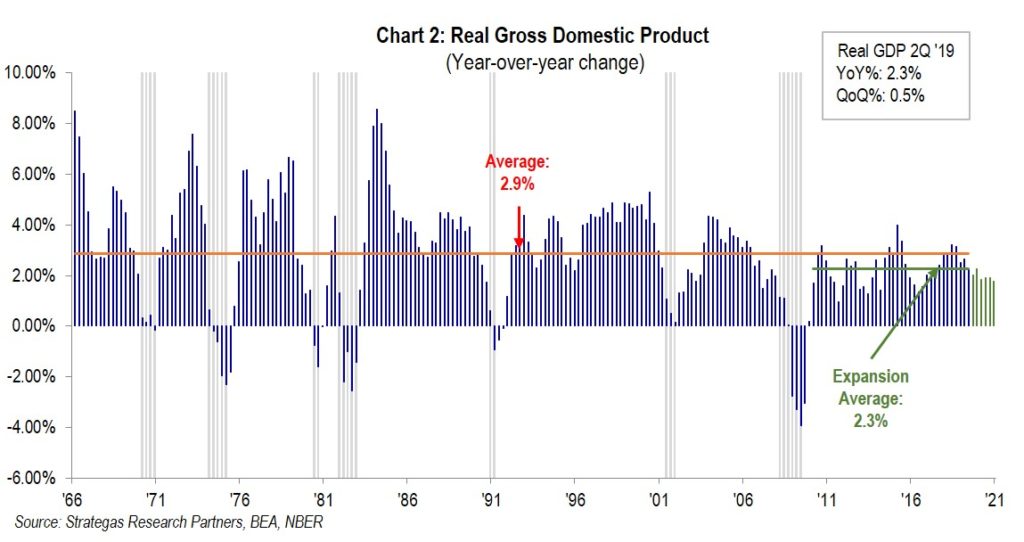

The above charts, measuring key economic data as the third quarter ends, indicate to us that the domestic economy continues to move forward, albeit at a slower pace, despite the concerns that currently prevail. GDP growth, coupled with strong employment, shows an underlying moderately growing and healthy economy. Chart 4 shows a very low level of weekly jobless claims which demonstrates a continued strong labor market and certainly is not a sign of imminent recession.
As for interest rates and inflation, the following charts indicate that at current levels both are supportive of a growing economy led by the consumer:
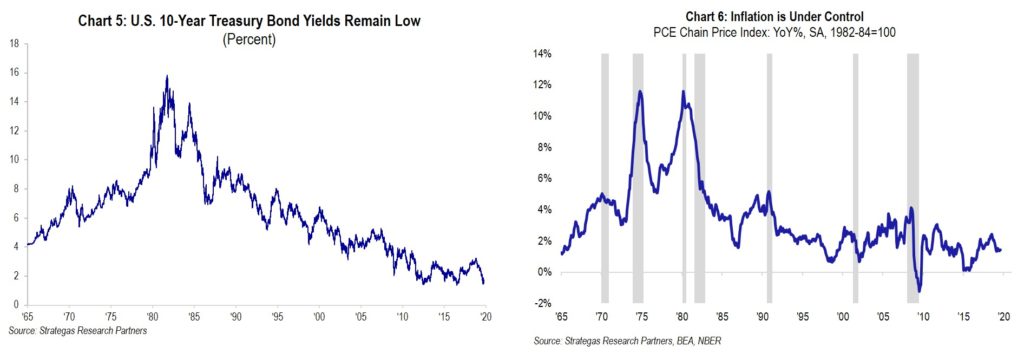
Charts 5 and 6 are both significant when focusing on the importance and health of the consumer. Low interest rates and low inflation are important factors, in our opinion, when determining the underlying strength of the consumer which makes up approximately 68% of the U.S. economy. Add to this the low level of consumer debt (Chart 7) as well as continued moderate wage growth (Chart 8), and this suggests to us that a meaningful driver of our economy remains strong:

Other factors that contribute to our domestic economy include the strength of business and government spending. Here the picture is more mixed and presents a meaningful concern:
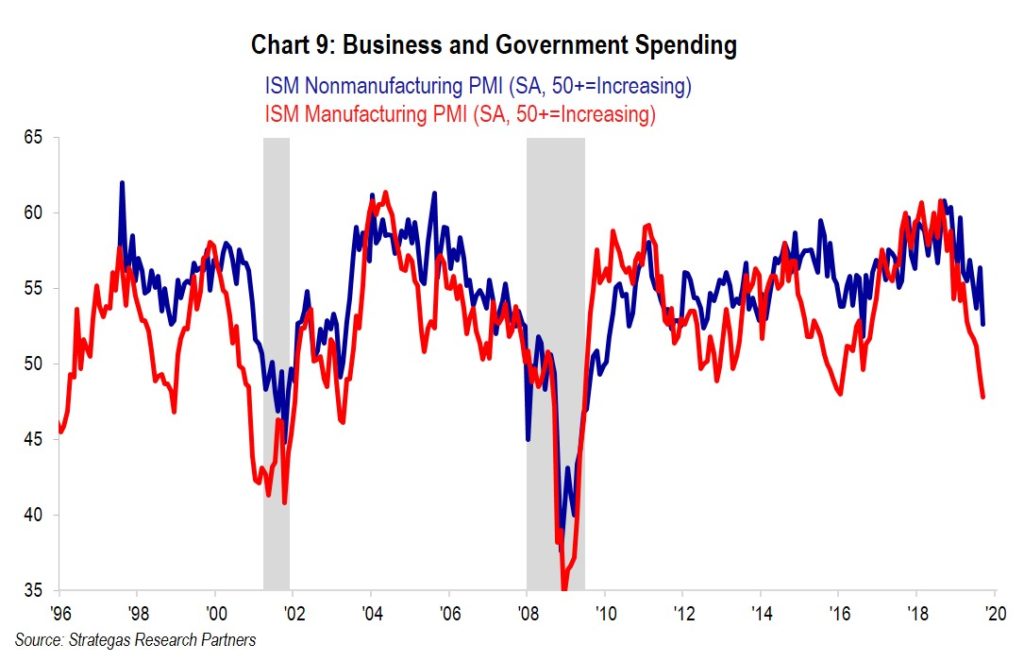
Chart 9 (above) shows that business spending has slowed, and in our opinion this reflects fallout from the trade war with China. It also could reflect the beginning of business concerns about the domestic political environment. The back and forth negotiations, which have been ongoing for more than a year, have resulted in harmful tariffs impacting the U.S. and China as well as other parts of the world, particularly Europe. Our economic consultants believe that this will likely shave one half of one percent from growth in our gross domestic product. On the other hand, as we enter an election cycle (which historically has been good for equities), it is well known that the incumbent administration attempts to spend more to help the economy along. Government spending has accelerated thus far this year and in our opinion will continue to. We are not sure that government spending can offset the reluctance of businesses to spend, but it will help. We will watch carefully to see if the slowdown in the industrial sector spending spreads to the service sector which would add to our worry about business output.
On the global scene, it appears that Europe’s economy is barely growing and has led to the EU reducing interest rates. We believe the continuing uncertainty regarding the UK’s exit from the EU only adds to European economic worries. China’s economy is also slowing as its government is trying to induce growth through fiscal stimuli. We believe that this is being done in an attempt to offset the impact of the trade war with the U.S. In all, these factors have led the World Trade Organization and the World Bank to modestly reduce their forecasts for global trade and global growth which was not robust to begin with, but certainly is not recessionary.
In our opinion, the slower global growth and the continuing concern over a trade war influenced the Federal Reserve’s recent decision to reduce interest rates by another 25 basis points. The investment community expects that the Fed will reduce rates at least one more time this year. We believe it is important for that additional decrease to happen, or equity markets will be very disappointed. (This could result in a rolling over of the equity markets at year end.) We will be watching the last two meetings of the Fed this year very carefully.
The politics of our country certainly make it easy for investors to not be too cheery. The imposing and impending vitriol of impeachment is of concern as it will bring Congress to a standstill (a Congressman told me that gridlock is now worse than ever). As the headlines fly from the media surrounding the President’s phone call with the President of Ukraine as well as alleged pay for play activities of former Vice President Biden and his son, we can expect increased volatility. Thus far, in general, this has not negatively impacted the equity markets. In fact, the quarter just ended resulted in the S&P 500 actually increasing 1.7% in the face of the trade war, an attack on the Saudi oil supply, and the initiation of an impeachment inquiry. Many of our equity investments had a positive quarter despite these factors and all have significant gains year-to-date.
Finally, one of our economic consultants, Strategas Research Partners, points to a nine factor checklist to estimate the likelihood of a bull market top. As of October 1, 2019, all nine do not have check marks next to them suggesting that we are not yet facing a market top and to reiterate, we do not see a recession in the foreseeable future. One of these boxes looks to a market top blow-off where investor optimism results in a buying frenzy. We certainly have not seen that lately. We have included that nine box survey in Appendix I for you to review.
Summary
We had a reasonably good quarter on balance. Equity investing paid off despite the growing wall of worry. Our internally managed defensive equity strategies both had positive quarters. Our Dividend Growth strategy led the way with a 2.8% net gain contributing to a year-to-date net return of nearly 18% (dividends for the strategy up to this point have grown approximately 10% on average). So, our continued bias to being somewhat defensive has certainly contributed to the net worth of our clients while taking less than market risk!
We pride ourselves on being conservative and prioritize return of capital as our most important concern. We also want to exploit the volatility and investor anxiety where we can find opportunity. As Buffett stated, when there is not a cheery market there just might be some opportunity. We do not believe we are in a “cheery market”. The following chart suggests that the individual investor has still not recovered in terms of market enthusiasm since the great “decession” of 2008/2009:
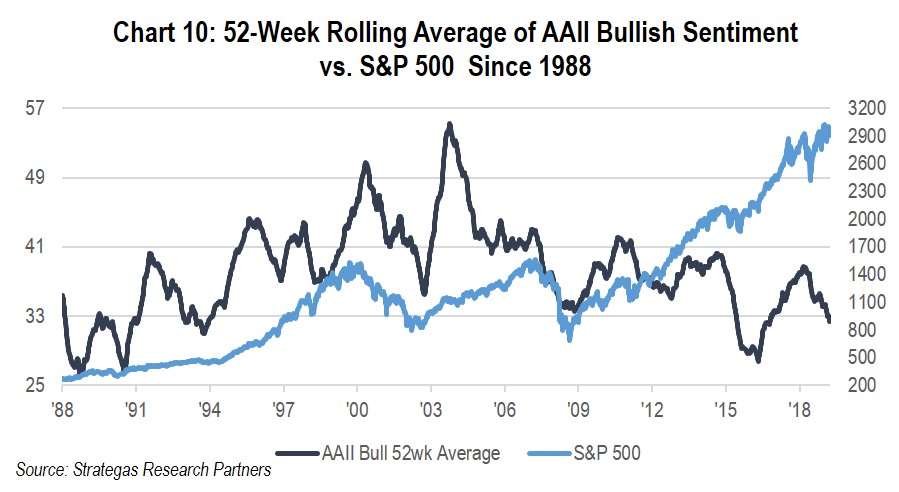
We believe chart 10 (above) suggests an unenthusiastic individual investor, and supports our belief that this has been the most unloved bull market in history. We do not share the same sentiment and will continue to look for high quality equity opportunities. But we can do it while continuing our bias to our defensive equity strategies.
Thus far this year, we have achieved strong performance for our clients with less risk by underweighting fixed income (although bonds have had good returns year-to-date) and overweighting our defensive equity strategies while somewhat underweighting our traditional equity strategies. Going forward, we still believe that recession is not imminent. However, we must take seriously the Democrat’s launch of an impeachment inquiry that could lead to articles of impeachment. Although, at this point, it appears to be a long shot that the Senate will vote to convict the President, the distraction and acrimony in Washington, D.C. could weigh on our economy. At the same time, the President will use whatever tools are available to him to fight the allegations of inappropriate behavior. He is known for being a counter puncher and will do whatever he can to ensure a strong economy which he believes is key to his reelection. History suggests a strong equity market in the final two years of a Presidential term (this being the third and next election year being the fourth). However, an impeachment inquiry possibly followed by articles of impeachment make it difficult to rely on history.
The fundamentals of low interest rates, low inflation, growing GDP, low unemployment, a vibrant consumer, as well as modestly growing corporate earnings should support a reasonable economy and equity market in the fourth quarter. However, anxiety and emotions will remain high given our current political turmoil and international complexities. We view one’s asset allocation to be critical to avoid being too aggressive on one hand or too conservative on the other. Our active management approach continues to focus on companies to invest in that we believe are either reasonably valued with growth opportunities or downright undervalued. We also believe that extremely low yielding fixed income does not present a capital appreciation opportunity or a way to earn after-tax returns above inflation, but remains an anchor in volatile times. So, a modest allocation remains our recommendation for most clients. Our defensive equity strategies, in our opinion, remain an overweight recommendation given their risk/reward profiles in what could be a more volatile fourth quarter and 2020.
Stay tuned! We look forward to reporting to you after year-end. In the meantime, have a wonderful fall and holiday season. We hope you can join us on November 7th for our next Thought Leadership Breakfast at the Garden City Hotel featuring Jon Ledecky, Co-Owner of the NY Islanders. Please call or visit with us for any of your wealth/money management needs.
Best regards,

Robert D. Rosenthal
Chairman, Chief Executive Officer,
and Chief Investment Officer
*The forecast provided above is based on the reasonable beliefs of First Long Island Investors, LLC and is not a guarantee of future performance. Actual results may differ materially. Past performance statistics may not be indicative of future results. Partnership returns are estimated and are subject to change without notice. Performance information for Dividend Growth, FLI Core and AB Concentrated US Growth strategies represent the performance of their respective composites. FLI average performance figures are dollar weighted based on assets.
The views expressed are the views of Robert D. Rosenthal through the period ending October 23, 2019, and are subject to change at any time based on market and other conditions. This is not an offer or solicitation for the purchase or sale of any security and should not be construed as such.
References to specific securities and issuers are for illustrative purposes only and are not intended to be, and should not be interpreted as, recommendations to purchase or sell such securities. Content may not be reproduced, distributed, or transmitted, in whole or in portion, by any means, without written permission from First Long Island Investors, LLC. Copyright © 2019 by First Long Island Investors, LLC. All rights reserved.

